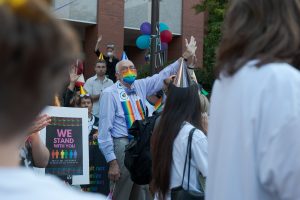Progress of 2010s not over as fight for justice continues
Social movements of last decade only start of conversations on necessary changes
June 11, 2020

With each decade there are moments or movements that come to define that decade and the people who grow up in them. For students at Seattle Pacific University and young people across the nation who grew up in the 2010s, it has been no different.
The 2020s, like previous decades, is slated to be important in propelling many recent social movements closer to the changes they sought in the past decade.
While there were sweeping changes and movements in the past decade, that does not mean that the fight is over since many communities are still plagued by injustice.
For decades, same-sex marriage had been illegal, and for much longer LGBTQ+ people were not accepted by society.
Before 2015 when same-sex marriage was legalized on the national level some states, like Washington, legalized same-sex marriage. Other states had a more complicated past, like California, which passed laws such as 2008 California Proposition 8 that banned same-sex marriage until 2013 when they finally were issued again in the state. Many states still had bans on gay marriage in 2015 such as Kentucky and Louisiana.
While there had been cases tried before by the Supreme Court related to similar LGBTQ+ issues, the case most notably tied to the legalization of same-sex marriages in all 50 states is the Obergefell v. Hodges case. On June 26, 2015 the Supreme Court ruled in a 5-4 decision favoring the legalization of same-sex marriage under the 14th amendment.
Like all social justice movements, while the motion granted many LGBTQ+ individuals the right to marry their partners, the fight for many is still ongoing. In February 2020, the Supreme Court took on a case that will decide if a Catholic adoption agency can deny LGBTQ+ individuals from adopting in Philadelphia. Recently,
Remembering moments like the legalization of same-sex marriage are extremely important in recognizing that, while landmark changes in society have occurred throughout history, it is not the end of battles for the people who are affected. The fight for LGBTQ+ rights and protections is still ongoing.
The #MeToo movement, another pivotal development of the 2010s that actually began in 2006 according to #MeToo movement’s website, gained momentum as conversations on sexual assault and harassment became paramount in many circles including entertainment, government, corporate America and universities.
Started by Tarana Burke to talk to Black young women and girls about sexual violence within low wealth communities, the movement widened vastly in 2017, engrossing social media with stories of countless women using the #metoo hashtag.
One of the most notable instances was in October 2017, when the New York Times reporters Jodi Kantor and Megan Twohey published a story detailing how Hollywood mogul Harvey Weinstein had been sexually harassing and assaulting women for decades, including some of the most well-known women in the industry. What followed was a slew of allegations both at the macro-level of other famous individuals, and at the micro-level with more conversations about sexual assault and harassment starting to occur in workplaces and homes across the nation.
According to an article by Vox, some action has been taken since the increased attention incited by the movement.
Some states — like New York and California — have begun to ban nondisclosure agreements covering sexual harassment and increasing worker protections, including for contractors who are often left out of these protections. Funds to help those who have experienced sexual assault and harassment, such as the Time’s Up Legal Defense Fund, have been created to help women access affordable legal representation.
While continuing to open up the conversation, the nation in many ways still has a long way to go politically in order to truly prevent sexual assault and harassment in the future.
Another large problem within this country is the longstanding systematic oppression experienced by Black Americans, which birthed the Black Lives Matter movement (BLM) in the 2010s for the purpose of finally bringing an end to these abuses of power.
According to the BLM website, the organization was founded after the acquittal of Trayvon Martin’s murderer George Zimmerman in 2013 by Alicia Garza, Patrisse Cullors and Opal Tometi.
Social media once again played an integral role as #BlackLivesMatter flooded cyberspace, discussing the role of government in the violence of Black Americans’ experiences, especially at the hands of police.
Since then, it has stood as a campaign and concerted effort to achieve justice for the countless deaths of Black Americans every year by police officers and prevent future acts of violence.
This movement has seen a recent resurgence with the ongoing protests concerning the deaths of George Floyd, Breonna Taylor and numerous others this year, and has sparked concerns in the minds of millions as discussion continues as to what is necessary in order to enact real change.
While each of these movements are all in various stages of progress towards their aims, it is clear that the work is not over. In fact, the 2010s, while crucial to these movements gaining traction, are just the start of ongoing conversations about changes needed in the future to truly create a fair and just society for all.

























































































